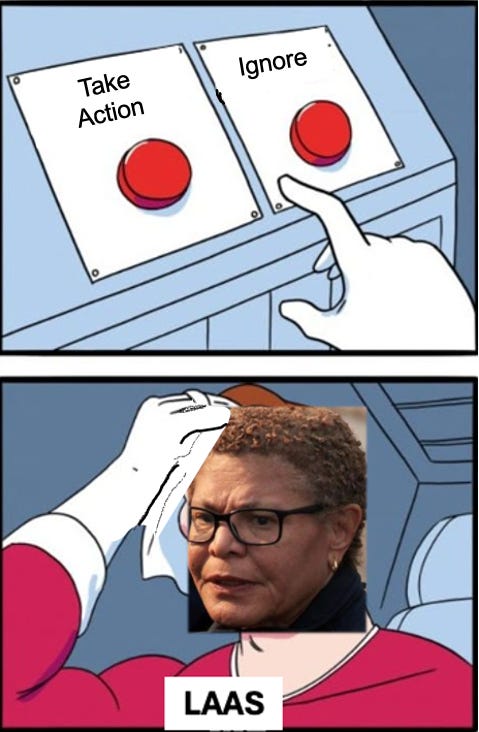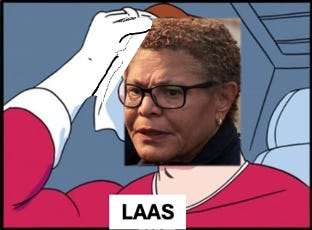Los Angeles Animal Shelters in Crisis: Will Mayor Bass Take Action?
Budget Cuts, Rising Euthanasia, and Leadership Failures—Will Mayor Bass Save LA’s Shelters Before It’s Too Late?
LOS ANGELES — A deepening crisis is engulfing Los Angeles Animal Services (LAAS), one of the nation’s largest municipal shelter systems. Chronic underfunding, policy mismanagement, and leadership failures have led to skyrocketing euthanasia rates, overcrowded shelters, and worsening conditions for animals and staff alike. The city’s response has been woefully inadequate, with funding cuts threatening to undo years of progress toward achieving No-Kill status. It is time for Mayor Karen Bass to step in and take decisive action before the situation deteriorates beyond repair.

A System in Free Fall
The numbers paint a grim picture. In the first nine months of 2024, LAAS euthanized 1,224 dogs—a staggering 72% increase from the same period a year prior. Over 1,500 cats were also put down, marking a 17% rise. The Los Angeles Times recently reported that dogs are now being killed simply for lack of space, not for medical or behavioral reasons. This marks a devastating reversal of the city’s long-standing commitment to No-Kill policies.
While advocates and volunteers have long sounded the alarm, city leadership has been slow to respond. Mayor Bass campaigned on promises to improve animal welfare, yet under her watch, LAAS’ already meager budget has been slashed further—from $31.7 million in 2023-24 to just $30.3 million for 2024-25, a third of what the department requested.
The consequences of these budget cuts extend beyond euthanasia rates. Overcrowded kennels have led to deteriorating conditions, with animals suffering from stress, malnutrition, and a lack of exercise. The problem is exacerbated by severe staffing shortages; volunteers and animal care technicians are stretched thin, leading to long wait times for adoptions and inadequate care for animals.
A Clear Path Forward
The Budget Advocates Report for the LAAS department, presented during the Budget Advocates meeting this past December, lays out a series of pragmatic recommendations that could help reverse this downward spiral.
This report, prepared by Neighborhood Council Budget Advocates in consultation with LAAS leadership and volunteers, provides critical insights into the funding and policy changes necessary to address the shelter crisis. Chief among them is increasing funding for spay/neuter programs. The city must fully fund the $12.2 million requested for the Animal Sterilization Fund and the Community (Feral) Cat Program. This investment would not only prevent countless unwanted litters but also save the city millions in future shelter costs.
Expanding the Reserve Animal Control Officer (RACO) program would also help alleviate staffing shortages, ensuring that more personnel are available to enforce spay/neuter laws and respond to animal emergencies. Additionally, purchasing two-way radios for staff would address serious safety concerns—an issue made urgent by the recent $563,250 Cal/OSHA fine after an employee was mauled at the Harbor Shelter.
LAAS leadership must also be held accountable for past failures. The continued reliance on Best Friends Animal Society and consultant Kristen Hassen, despite their track record of policy missteps, has exacerbated the crisis. Their Managed Intake and Community Animals programs have encouraged a dangerous shift in policy, pushing vulnerable animals back into the streets rather than ensuring they receive proper shelter and care.
These approaches have increased instances of stray and aggressive dogs in communities, leading to public safety concerns and higher euthanasia rates when these animals inevitably return to shelters in worse condition. Mayor Bass must re-evaluate these partnerships and prioritize policies that actually serve both the animals and the people of Los Angeles.
Another critical issue is the Northeast Valley Animal Shelter. Originally built with voter-approved Proposition F funds to be a fully functioning municipal shelter, it has instead been leased to rescue organizations, limiting its capacity to serve as a public resource. With LAAS facing chronic overcrowding and a dire lack of kennel space, transitioning the Northeast Valley Shelter back under city control is essential.
To do so responsibly amidst looming budget deficits, the city should explore phased reintegration strategies, including securing grant funding, public-private partnerships, and revenue-generating adoption and veterinary services. Utilizing volunteers and expanding the Reserve Animal Control Officer (RACO) program could help offset operational costs. Reclaiming this facility for municipal operations would provide immediate relief to the overburdened shelter system, reduce long-term expenses, and restore public trust in the city’s commitment to animal welfare.
The Mayor’s Moment of Truth
Mayor Bass now faces a defining choice: will she allow LAAS to continue its downward trajectory, or will she take meaningful action to restore humane conditions in the city’s shelters?
The answer should be clear. The proposed $34.8 million budget for LAAS in 2025-26 is a modest request, representing less than 0.3% of the total city budget. Denying it would be a dereliction of duty. Without immediate intervention, more healthy, adoptable animals will die needlessly, and the city will continue facing legal and financial consequences due to unsafe shelter conditions.
While city officials justify cutting the LAAS budget by citing projected deficits in the coming years, these financial challenges only underscore the urgency of strategic investment. Fully funding LAAS’ budget request is not just about protecting animals—it is a fiscally responsible move that would reduce long-term expenses by lowering shelter intake and euthanasia rates, minimizing legal liabilities, and optimizing shelter operations.
By making this investment now, Mayor Bass can demonstrate leadership that not only safeguards the city's most vulnerable animals but also benefits taxpayers and enhances public safety—a win-win for everyone.
Los Angeles once prided itself on being a leader in humane animal care. That legacy is now in jeopardy. Mayor Bass has the power to change that—but only if she acts now.
Ed Boks is a former Executive Director of the New York City, City of Los Angeles, and Maricopa County Animal Care & Control Departments, and a former Board Director of the National Animal Control Association. His work has been published in the LA Times, New York Times, Newsweek, Real Clear Policy, Sentient Media, and now on Animal Politics with Ed Boks.





The path forward is not so clear a path. The city can be mandated to spend its allocated budget on spay/neuter vouchers but without available appointments and a marketing outreach to convey available services to communities it’s a dead end. Happy to resend the plan for 10 high volume clinics for a one time initial investment of 8M. 300,000 animals in 18 months, problem solved. The city could do it, Best Friends with 114M sitting in the bank could do it or I can keep slogging away. The Commission will be meeting at 6:00PM on Tuesday the 25th. You and anyone else who would like to ask the obvious question “why don’t you do something significant to change the trajectory” should be there
Kelly Holland
The Animal Rescue Alliance
I’ve been working the past few weeks with Harbor shelter volunteers in San Pedro. Exposing the Horrifying conditions during the recent rain. If that isn’t bad enough they are hosing kennels down and the terrifying dogs, leaving them standing puddles of water. Volunteers are illegally being fired, animals still being euthanized when the KENNELS are empty after the fire transports out by Best Friends. The kennels are covered in poop, spread of disease is next. Staff sits around, potential adopters are treated like they are nothing but a bother.
Instead working to make the place better for the animals—they are using volunteers as scapegoats- punishing them with rules like no videotaping??? Or ILLEGALLY firing them for speaking up?
Just yesterday, a barely year old puppy at Harbor Shelter (LA City Shelter) was to be euthanize at 4pm - for a vague “nipping” . Curious?
Where is the rabies quarantine policy? Was it followed? At 3:30pm??? Where did little Charles go a A 2179444?
Why all the secrecy and deception?
Of course we'll do a formal FOIA request- but will it be truthful? I’ve heard and seen documents with my own eyes that were doctored from LA County shelters before.
LA City Shelter system seems to be tainted and CANNOT BE TRUSTED. Mayor Bass- her emails bounce back- and those on her appointed LA animal commission don’t seem to have power or information as to the HORROR THAT IS LA CITY SHELTER SYSTEM. They weren’t even aware Annette Ramirez the temp general manager is dumping the lost, friendly cats out the back door of the shelters to die. 🙀
All this, and California taxpayers are paying $30 million a year for this incompetence and CRUELTY.
I’ve often wondered to myself…. if volunteers at the LA City Parks departments or any of their other many departments that use volunteers are treated with such distain and punished for speaking up when they see something so abhorrent going on?